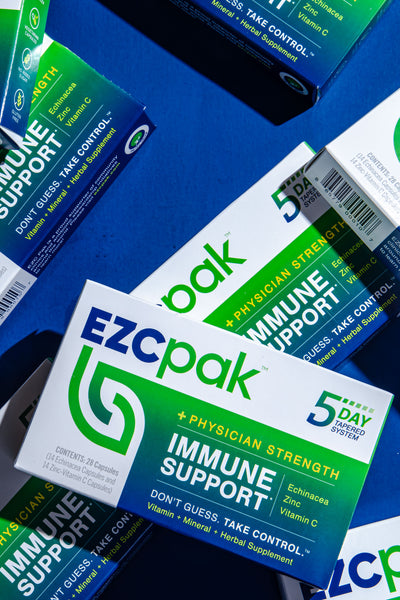Four Ways to Prevent Infection
We’ve all heard of infections -- but do you really understand what they are and how they can be prevented? In this article, we’ll define viral infections, and then dive into four effective ways to prevent them.
Don’t know the difference between bacterial and viral infections? Bacteria are found all over the place: in our food, in our bodies, and lots of other varied environments. Strep throat and urinary tract infections both constitute bacterial infections, and these ailments are treated with antibiotics. Viral infections require a living host to multiply and survive. Viral infections include common colds and the flu, and cannot be treated with antibiotics.
Since you cannot use antibiotics to treat viral infections, here are some tips and tricks to help prevent them:
Look to Zinc to Boost Immunity
Zinc boasts lots of immune-boosting properties, so try to incorporate it into your daily diet. You’ll find loads of zinc in shellfish such as oysters, crab, or lobster. If you’re vegan, then you can still get zinc from fortified cereals, leafy greens, and legumes.
There’s also convincing meta-analysis that zinc may help ward of childhood death and disease. Research published to the Cochrane Library suggests that children who consumed zinc were not only less at risk of diarrhea, but that they also grew taller than other children who did not take zinc. Why is this so important? In underdeveloped countries, diarrhea kills young children.
Dr. Sarath Malepati, founder of EZC Pak, agrees with the meta-analysis, stating that “zinc is an essential trace metal with a wide range of critical bodily functions. These processes, which are fundamental to life, include gene expression, enzyme function, and metabolism. Zinc is involved in virtually every aspect of our immune system’s ability to function.”
Incorporate Vitamin C Into Your Diet
It’s not just zinc that helps keep you well, either. There’s perhaps no more famous way to boost immunity than with vitamin C. You can get vitamin C from food or from a supplement.
When looking for a vitamin C supplement, look for one that is sugar-free and all-natural.
When planning your meals, remember there are lots of delicious sources of vitamin C available during every season. In fall and winter, enjoy pumpkin and acorn and butternut squashes, plus citrus fruits. In the spring and summer, look for kiwis, papayas, and berries.
Wash Your Hands By The Book
A simple rinse with soap and water isn’t enough to keep germs off your hands. The Center for Disease Control (CDC) outlines exactly how to wash your hands properly:
- Wet your hands with running water, then apply soap.
- Lather hands, including back of hands, between fingers, and under fingernails.
- Scrub for at least 20 seconds.
- Rinse hands under running water.
- Dry hands with a clean paper towel, or allow them to air dry.
Another note: If you’re only washing up after you use the restroom, then you’re not washing your hands enough. The CDC recommends washing hands after a long list of activities, including:
- Before eating -- and before, during, and after preparing food
- Before and after caring for someone ill or changing diapers
- After touching an animal, animal waste, or garbage
- Before and after treating an open cut or wound
- After blowing your nose, coughing, or sneezing
Make sure you are following all of these steps to prevent the spread of infections. Supervise young children until good habits are established.
Get Enough Quality Sleep
Don’t underestimate the value of a good night’s sleep on your health. While sleep won’t make viruses disappear, it can boost your immune system so that you’re better able to fight off viral infections.
According the the Mayo Clinic, studies show that those who get either low-quality or too little sleep are more likely to become sick after virus exposure. Plus, the clinic adds, those who get too little sleep also take longer to recover from infections.
How much sleep do you really need? It depends on your age and activity level:
- Newborns: 14 to 17 hours
- Toddlers: 11 to 14 hours
- Preschoolers: 10 to 13 hours
- Young Children: 9 to 11 hours
- Teenagers: 8 to 10 hours
- Young and regular adults: 7 to 9 hours
- Older adults: 7 to 8 hours
To sleep better, lower your thermostat and avoid electronics and caffeine before bed.
Stop Infections Before They Start
There’s a lot you can do to prevent viral infections before they become a problem. This cold and flu season, outsmart viruses from the start. Make sure you’re getting enough zinc and Vitamin C. Wash your hands thoroughly and get enough rest. These tips can help you feel better all year long.






